A Giant Of Italian Cinema
Vittorio De Sica Returns to the Big Screen in San Francisco
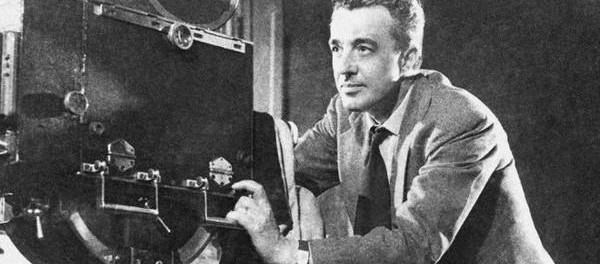
By Ron Merk
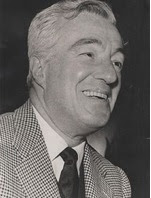 If you’re a cinema fan, it’s hardly likely that you don’t know the name Vittorio De Sica. He was one of the finest directors and actors ever to work in the Italian cinema. As an actor he was charming, irresistible and truly wonderful. As a director, he took his skill and experience, and directed some of the most wonderful performances of the finest Italian actors, bringing them to levels of artistry that would not have been possible without his able directorial hand. He turned Sophia Loren from a film performer into an actress, winning her the first-ever Best Actress Academy Award for a performance in a language other than English. The film was “Two Women” (La Ciociara) which will be screening as part of this one-day festival of De Sica’s work.
If you’re a cinema fan, it’s hardly likely that you don’t know the name Vittorio De Sica. He was one of the finest directors and actors ever to work in the Italian cinema. As an actor he was charming, irresistible and truly wonderful. As a director, he took his skill and experience, and directed some of the most wonderful performances of the finest Italian actors, bringing them to levels of artistry that would not have been possible without his able directorial hand. He turned Sophia Loren from a film performer into an actress, winning her the first-ever Best Actress Academy Award for a performance in a language other than English. The film was “Two Women” (La Ciociara) which will be screening as part of this one-day festival of De Sica’s work.
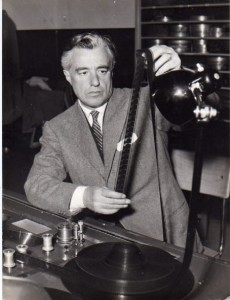 Under the direction of Amelia Antonucci, this program offers four of De Sica’s finest works. All presented in new 35mm prints or recent digital restorations, these films have never looked better, and truly deserve another look, assuming you’ve seen them in the past, and how could you not, if you love cinema? But if you were marooned on a desert island until now, and missed these films, here’s your chance to make up for the lost time, and the lost opportunity of seeing a master cinema director at work.
Under the direction of Amelia Antonucci, this program offers four of De Sica’s finest works. All presented in new 35mm prints or recent digital restorations, these films have never looked better, and truly deserve another look, assuming you’ve seen them in the past, and how could you not, if you love cinema? But if you were marooned on a desert island until now, and missed these films, here’s your chance to make up for the lost time, and the lost opportunity of seeing a master cinema director at work.
But the window of opportunity is very brief. One day, in fact, and it’s Saturday, September 26, 2015 at the Castro Theater in San Francisco.
Here’s the program:
11:30 AM – La Ciociara (Two Women)
(Drama/War – 1960 – 121 minutes.)
2:00 PM – L’Oro di Napoli (The Gold of Naples)
(Comedy – 1954 – 138 minutes.)
5:00 PM – Matrimonio all’Italiana (Marriage Italian Style)
(Comedy/Drama – 1964 – 102 minutes.)
7:30 PM – Il Giardino dei Finzi-Contini (The Garden of the Finzi-Continis)
(Drama – 1970 – 95 minutes)
9:30 PM Party in the Castro Theatre’s mezzanine
All films will be presented with English subtitles.
More info at www.CinemaItaliaSF.com
Vittorio De Sica (7 July 1901 – 13 November 1974) was an Italian director and actor, a leading figure in the neorealist movement.
Four of the films he directed won Academy Awards: Shoeshine and Bicycle Thieves were awarded honorary Oscars, while both Yesterday, Today, and Tomorrow and The Garden of the Finzi-Continis won the Best Foreign Language Film Oscar. Indeed, the great critical success of Shoeshine, (the first foreign film to be so recognized by the Academy of Motion Picture Arts and Sciences) and Bicycle Thieves helped establish the permanent Best Foreign Film Oscar. These two films generally are considered part of the canon of classic cinema.
De Sica was also nominated for the 1957 Oscar for Best Supporting Actor for playing Major Rinaldi in American director Charles Vidor’s 1957 adaptation of Ernest Hemingway’s A Farewell to Arms, a movie that was panned by critics and proved a box office flop. De Sica’s acting was considered the highlight of the film.
Born into poverty in Sora, Lazio (1901), he began his career as a theatre actor in the early 1920s and joined Tatiana Pavlova’s theatre company in 1923. In 1933 he founded his own company with his wife Giuditta Rissone and Sergio Tofano. The company performed mostly light comedies, but they also staged plays by Beaumarchais and worked with famous directors like Luchino Visconti. His meeting with Cesare Zavattini was a very important event: together they created some of the most celebrated films of the neorealistic age, like Shoeshine and Bicycle Thieve s(released as The Bicycle Thief in America).
De Sica appeared in the British television series The Four Just Men (1959). His passion for gambling was well known. Because of it, he often lost large sums of money and accepted work that might not otherwise have interested him. He never kept his gambling a secret from anyone; in fact, he projected it on characters in his own movies, like Count Max (which he acted in but did not direct) and The Gold of Naples.
In 1937 he married Giuditta Rissone, whom he met ten years before and who gave birth to their daughter, Emi. In 1942, on the set of Un garibaldino al convento, he met Spanish actress Maria Mercader (sister of Ramon Mercader, Trotsky’s assassin), with whom he started a relationship. After divorcing Rissone in France in 1954, he married Mercader in 1959, in Mexico, but this union was not considered valid under Italian law. In 1968 he obtained French citizenship and married Mercader in Paris. Meanwhile he had already had two sons with her: Manuel, in 1949, who became a musician, and Christian, in 1951, who would follow his father’s path as an actor and director. Although divorced, De Sica never parted from his first family. He led a double family life, with double celebrations on holidays. It is said that, at Christmas and on New Year’s Eve, he used to put back the clocks by two hours in Mercader’s house so that he could make a toast at midnight with both families. His first wife agreed to keep up the facade of a marriage so as not to leave her daughter without a father.
Vittorio De Sica died at 73 after a surgery at the Neuilly-sur-Seine hospital in Paris.
More details about the films in the series:
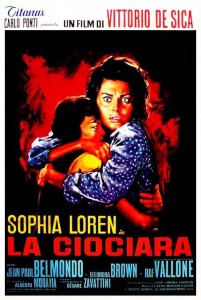 11:30 AM
11:30 AM
La Ciociara (Two Women)
(Drama/War – 1960 – 121 mins.)
Director: Vittorio De Sica Screenplay: Cesare Zavattini Cinematographer: Gábor PogányStarring: Sophia Loren, Jean-Paul Belmondo, Raf Vallone
RESTORED 35mm PRINT!
 Two Women is a recent restoration of the acclaimed classic that won Sophia Loren the Best Actress award at the Cannes Film Festival and the Academy Award for Best Actress – the first time any non-English speaking role had garnered that prize. (“Before I made Two Women, I had been a performer,” Loren said. “Afterward, I was an actress.”) In De Sica’s stunning adaptation of the Alberto Moravia novel, Loren plays Cesira (a role that was reportedly first offered to Anna Magnani, who turned it down), a shopkeeper who flees from Rome, along with her adolescent daughter Rosetta (Eleanora Brown), to escape the Allied bombardment during the last days of World War II. In the mountains of her native Ciociara, the hard-nosed widow finds refuge with her people and strikes up a flirtation with an idealistic young intellectual (Jean-Paul Belmondo); however, she soon discovers that even her financial cunning offers no protection from the ravages of war.
Two Women is a recent restoration of the acclaimed classic that won Sophia Loren the Best Actress award at the Cannes Film Festival and the Academy Award for Best Actress – the first time any non-English speaking role had garnered that prize. (“Before I made Two Women, I had been a performer,” Loren said. “Afterward, I was an actress.”) In De Sica’s stunning adaptation of the Alberto Moravia novel, Loren plays Cesira (a role that was reportedly first offered to Anna Magnani, who turned it down), a shopkeeper who flees from Rome, along with her adolescent daughter Rosetta (Eleanora Brown), to escape the Allied bombardment during the last days of World War II. In the mountains of her native Ciociara, the hard-nosed widow finds refuge with her people and strikes up a flirtation with an idealistic young intellectual (Jean-Paul Belmondo); however, she soon discovers that even her financial cunning offers no protection from the ravages of war.
“A powerful experience to behold, and one of De Sica’s finest films.” (Film Threat).
Restored by Fondazione Scuola Nazionale di Cinema and Mediaset. Print courtesy of Istituto Luce Cinecittà.
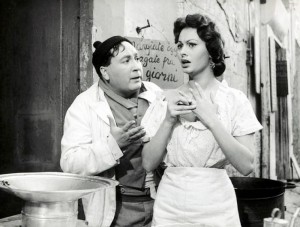 2:00 PM
2:00 PM
L’Oro di Napoli (The Gold of Naples)
(Comedy – 1954 – 138 mins.)
Director: Vittorio De Sica Screenplay: Cesare Zavattini, Vittorio De Sica, Giuseppe Marotta Cinematographer: Carlo Montuori Starring: Silvana Mangano, Sophia Loren, Eduardo De Filippo, Paolo Stoppa, Totò
A personal tribute to Naples, where director De Sica spent his first years, L’Oro di Napoli, based on the book by the same title, by Giuseppe Marotta, is a collection of six Neapolitan episodes: a clown exploited by a hoodlum; an unfaithful pizza seller (Loren) losing her husband’s ring; the funeral of a child; the impoverished inveterate gambler Count Prospero B. being reduced to force his concierge’s preteen kid to play cards with him; the unexpected and unusual wedding of Teresa, a prostitute; and the exploits of “professor” Ersilio Micci, a “wisdom seller” who “solves problems.”
This is the West Coast Theatrical Premiere of the complete uncut version. Originally released in this country with only four of the stories-and rarely seen in any form-this is the complete, uncut version. The archival print is courtesy of istituto Luce Cinecittà. A Rialto Pictures release.
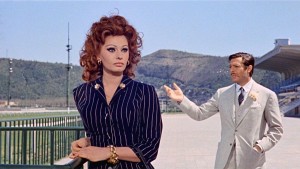 5:00 PM
5:00 PM
Matrimonio all’Italiana (Marriage Italian Style)
(Comedy/Drama – 1964 – 102 mins.)
Director: Vittorio De Sica Screenplay: Eduardo de Filippo, Renato Castellani, Antonio Guerra, Leo Benvenuto and Piero de Bernardi Cinematographer: Carlo Montuori Starring: Sophia Loren, Marcello Mastroianni, Aldo Puglisi
In Marriage Italian Style (1964) De Sica returns behind the camera with a comedy with a tragic flair: a delightful adaptation of Eduardo De Filippo’s play “Filumena Marturano,” in which a man leaves his fiancée to go to the deathbed of his mistress. Moved by her condition, he swears to marry her if she recovers.
NY Times critic Bosley Crowther at the presentation of Marriage Italian Style in New York in 1964 said, “Whenever Vittorio de Sica gets together with Sophia Loren to make a motion picture, something wonderful happens. It did when he directed her in Gold of Naples, Two Women, Yesterday, Today and Tomorrow, and now Marriage Italian Style. The something wonderful that’s happened is the conception and projection of a film so frank and free and understanding of a certain kind of vital woman—and man, too—that it sends you forth from the theater feeling you’ve known her — and him — all your life.”
The 4K restoration is by Fondazione Cineteca di Bologna, Surf Film, Fondation Technicolor pour le Patrimoine du Cinéma (Severine Wemaere) with the collaboration of Memory Cinéma (Gilles Duval). The restoration was carried out at L’Immagine Ritrovata laboratory in 2014.
 7:30 PM
7:30 PM
Il Giardino dei Finzi-Contini (The Garden of the Finzi-Continis)
(Drama – 1970 – 95 mins.)
Director: Vittorio De Sica Screenplay: Vittorio Bonicelli, Ugo Pirro Cinematographer:Ennio Guarnieri Starring: Dominique Sanda, Lino Capolicchio, Helmut Berger
De Sica returns to his old mastery with Il giardino dei Finzi-Contini (“The Garden of the Finzi-Continis,” 1970). Based on a Giorgio Bassani novel set during World War II, about a wealthy, dreamily reclusive Jewish family oblivious to looming dangers, the film glows with repressed emotion and painful nostalgia. Although his shooting style had evolved, De Sica’s disillusioned love for humanity is once again piercingly palpable. Writing in The New Yorker, Pauline Kael called it “a beautiful surprise—a return not to neo-realism but to the limpid style of his neo-realist days.”
De Sica returns with a film that seems to owe little to his previous work. It is not neorealism; it is not a comic mixture of bawdiness and sophistication; it is most of all not the dreamy banality of his previous few films. In telling of the disintegration of the Jewish community in one smallish Italian town, De Sica merges his symbols so that they evoke the meaning of the time, creating a feeling of nostalgia for a lost time and place in which inhabitants miss what they haven’t as yet lost.
Digital restoration by Antony Morato, in collaboration with Istituto Luce Cinecittà and L’Uomo Vogue. Digital presentation courtesy of Istituto Luce Cinecittà.
Tickets are now on sale. You can buy separate tickets for the films and the party, but this is a feast of Italian cinema and food in which you’ll want to indulge yourself. This show is going to sell out. So, buy your tickets today. It’s going to be a great day at the Castro Theatre, and there will be some guests… not yet announced, but I have a feeling who one of them might be… no names, please!
Tickets are $12 per screening. Tickets for the party are $20. A pass to see all four films and attend the party is $60. Tickets can be purchased online at www.CinemaItaliaSF.com or by phone at 415-552-5580.
Official Website: www.CinemaItaliaSF.com
